How often have you had a strong “gut feeling” about something, or a sensation of “Butterflies in your stomach?” These things that you feel are real, and not a figment of your imagination.
This is because the gastrointestinal track is sensitive to emotions such as anger, anxiety, sadness and elation, and such feelings can trigger digestive issues.

Becoming Aware Of Gut Health
I was recently invited to a lunch event jointly organised by PanAsia Surgery Group and Sogurt. We looked into the connection between the brain and the gut.
At the lunch event, we learnt more about our gut health, and how our gut affects our brain health, as well as what sort of foods are beneficial to our gut.
Gut-Brain Axis
Dr. Melvin Look, the Director of PanAsia Surgery and Consultant Surgeon in Gastrointestinal and Obesity Surgery, shared with us about digestive problems on the gut-brain axis, which is a system of connections and communication between the gastrointestinal tract and the brain.
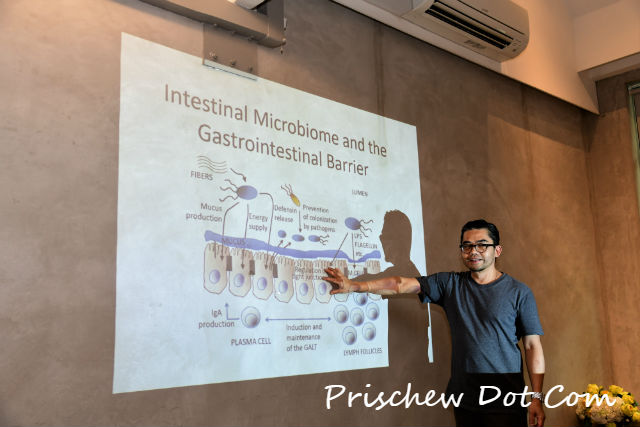
According to Dr. Look, the main criteria for a healthy human Gastrointestinal system are:
- Effective digestion and absorption of food
- Absence of Gastrointestinal illness
- Normal and stable intestinal microbiota
- Effective immune status
- Good well-being
Gut Function and Dysfunction
And living in a healthy person’s Gastrointestinal tract, reside thousands of microbes, the gut microbiota, which have several functions.
A few of these functions include the prevention of colonisation by pathogenic microorganisms, providing energy for the gut, the regulation of the immune system as well as being a modulator of cancer risk.
And if we have gut dysfunction, this can lead to problems such as obesity, fatty liver, depression, Alzheimer’s and Parkinson’s disease, and Autoimmune conditions.

The interconnection between the gut and the brain couldn’t be more obvious. For instance, if you suffer from depression, which is a brain-linked condition, this can affect functional gastrointestinal problems and cause irritable bowel movement, functional constipation and diarrhoea, as well as bloating and dyspepsia.
And on the other hand, an irritation in the gastrointestinal system can send signals to the brain to trigger mood changes, causing anxiety and depression.
In relation to this, people who have functional gastrointestinal problems can perceive pain more acutely due to the sensitivity of the brain to the pain signals coming from the gut.
What Disrupts Gut Health
Dr. Look also pointed out common things that disrupts our gut health and these are diets high in processed foods such as refined carbohydrates, sugar, processed meats and fats.
Ageing, according to Dr. Look, also affects our gut health because as we age, we need less calories to sustain ourselves yet we need more micronutrients at the same time. Our body’s gut absorption also decreases with age, too.
As well, taking highly processed foods, seed oils, grains, suffering from chronic stress, chronic infections and consuming certain medications such as antibiotics and birth control pills can disrupt the gut and cause poor gut health.

Improving Gut Health
In order to improve our gut health, Dr. Look suggested we go for foods rich in fibre such as resistant starch and prebiotic fibres, as well as eliminating pro-inflammatory stimuli such as sugar, caffeine, seed oils and processed foods from the diet.
At the same time, he also recommended that we increase our intake of anti-inflammatory foods, such as Omega-3, fermented foods and antioxidants, as well as hydrating yourself regularly.
Besides diet, other factors to improve gut health would be to limit our intake of alcohol and tobacco, as well as to partake in regular exercise and mediation.
And taking probiotic and prebiotic supplements help too. In fact, supplements, Dr. Look pointed out, are especially important for the older folks, to maintain or improve their gut health.
Both probiotic and prebiotic are important to our gut health, in that the probiotics are the good bacteria in our gut, and prebiotic are the dietary fibre that helps to feed the probiotic bacteria, allowing therm to thrive.
Furthermore, in terms of taking prebiotic and probiotic supplements, Dr. Look also shared with us, more on the various types of good bacteria and how each one of these helps to improve our gut health in different ways, ranging from aiding in nutrient absorption and immune health to relief from gas and diarrhoea and overall digestion.
Feeding and Nourishing the Gut
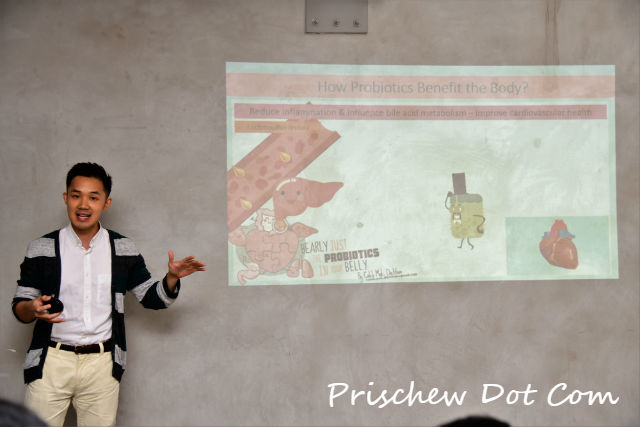
As well, dietician Caleb Mok also shared his knowledge about how to feed and nourish the gut.
According to Mok, by taking either food containing probiotic or probiotic supplements, the probiotic interacts with the immune cells, thus enhancing the communication channels between such cells and in turn, improving our gut health.
Importance Of Probiotics
When consumed regularly, probiotics can benefit the body in several ways, including the prevention of diseases in the oral cavity, the reduction of inflammation and maintaining a good immune balance, preventing the development of allergy.
So for instance, if we do not have enough probiotics in the body, this can cause problems to us, such as oral decay and auto-immune diseases.
As well, having a lack of probiotics in the body can also cause wrinkles in the ageing skin of older people – but this too, can be kept at bay by consuming probiotics which will interact with the immune cells to improve skin structure.
Foods Rich in Probiotics
What are the foods that contain probiotics then? According to Mok, these include Euglena, a micro-algae, as well as sea vegetables, and food which is rich in soluble fibres such as mangoes, oranges, oats, beans and legumes. Foods rich in polyphenols also contain probiotics.
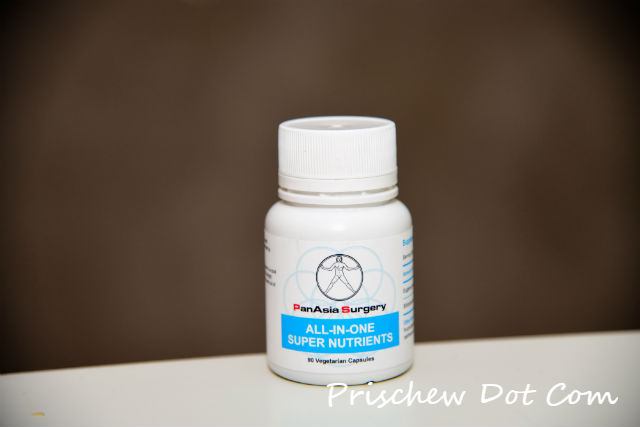
In terms of selecting food with probiotics, Mok pointed out that the package should possess statements such as “with active live cultures” and also state that the product contains X billions of probiotics and will give X billion of consumed by the best-before date.
Fortified Dairy products such as yoghurt are particularly good for probiotic consumption mostly because these foods are served cold, meaning that the probiotic should be able to thrive.
As well, products that are served cold, usually also contain breeds of probiotics that can withstand the acidity of the stomach.
Otherwise, Mok stressed that the probiotics should be encapsulated and coated so that they would not die in the acidity of the stomach. This is especially so, in the case of supplements.

However, if the probiotic is added in to hot foods such as Miso soup, Mok added that it is important to add the Miso powder toward the end of the cooking process so that the probiotic does not get killed during the boiling process as they are generally susceptible to heat.
Making it a point to consume probiotic-rich foods is especially important if you are taking antibiotic medication as such medication will kill the bad bacteria as well as the good ones in the body.
So this means that the probiotic will need to be constantly replenished, both during as well as soon after completing the antibiotic course. As well, consuming probiotic can also help to combat or reduce the possible side effects of the antibiotics, if any.
Said Mok, “A healthy gut is not just a healthy gut. It also plays a more important role in preserving the other functions of the body.”
Probiotics-Rich Sogurt
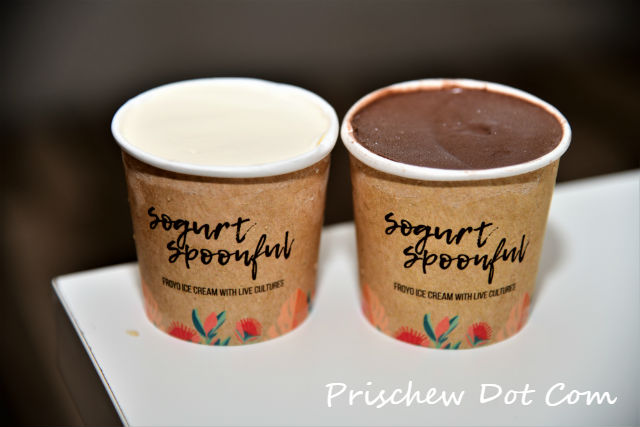
In line with consuming healthy, probiotics-rich foods, guests were served Sogurt’s latest creation, Sogurt Spoonful, throughout the session. A hard-serve frozen yoghurt packed with live cultures, Sogurt Spoonful is rich in probiotics and probiotics.
As well, it is low in sugar and made with coconut oil for optimal gut health. Furthermore, the treat has also been given the Healthier Choice symbol by the Singapore Health Promotion Board.
And not only is it good for your gut, but it was also deliciously tasty as well. Sogurt Spoonful has some rather interesting flavours such as the Premium Avocado Gula-Melaka and Strawberry Yuzu, both of which I had tried.
The Strawberry Yuzu is subtly sweet with a hint of a sour note at the same time, while the Premium Avocado Gula-Melaka flavour has a strong hint of Gula-Melaka on the first bite, with a very subtle Avocado flavour that I could only pick up after eating a few spoonfuls of it.

And Chocolate lovers will also like the Dark Chocolate flavour. This is rich and bittersweet, but at the same time, has just the right hint of sweetness so that it does not get “jelak.” So as such, I thought that it is quite easy to polish off the small tub.
Lunch from Kara Cafe & Dessert Bar
At the event, our lunch was also in line with the same concept; we had several grain-based poke bowls specially prepared by Kara Cafe & Dessert Bar for us to pick from.
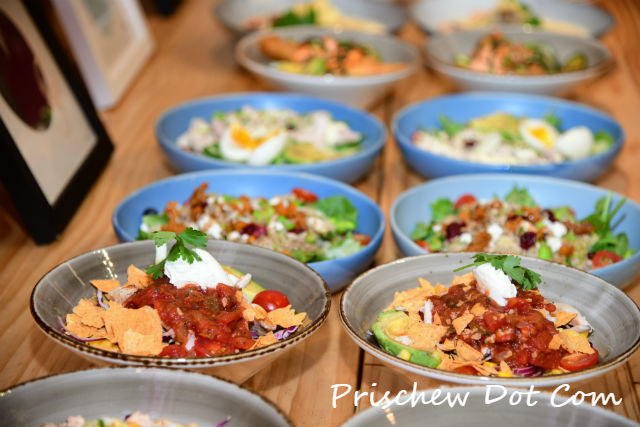
But for those who were not huge fans of poke bowls, a couple of salads and pasta options were available for lunch as well.
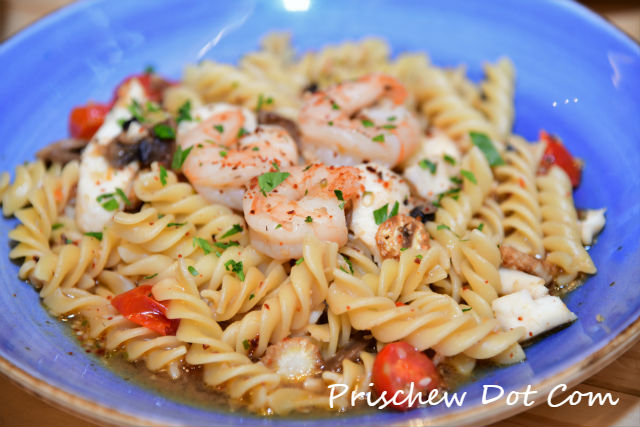
My choice had been the Pork Belly Miso bowl which was served with fluffy Quinoa Salad and I had thought that it was really delicious.
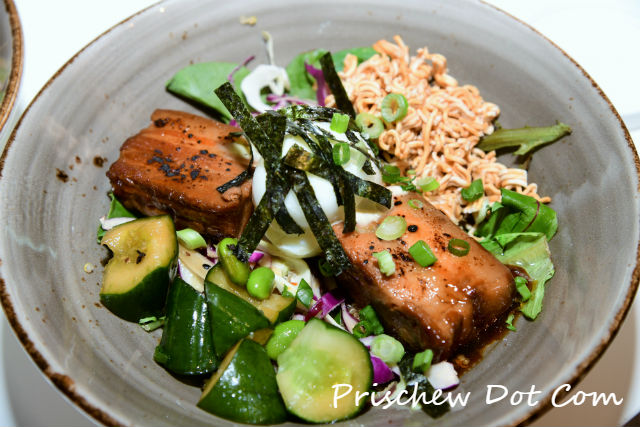
The pork belly was so soft and tender and the addition of the Miso cream complemented the flavours really nicely. I also enjoyed the crispiness from the Ramen Chips which were sprinkled into the dish. Who knew that gut-healthy food could taste so good?

I Learnt A Lot
I would say that I left the event feeling rather full of Sogurt, but very satisfied, at the same time.

Throughout the course of the lunch, I had definitely learnt a lot of useful information about how to take care of my gut, and these are tips that I think that I would now be trying to bring into my daily routines.

Leave a Comment